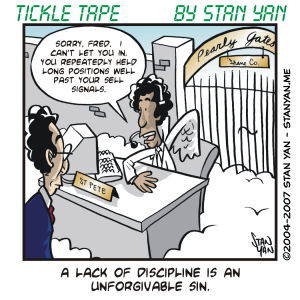Trading requires intense concentration. As easy as it sounds, it’s psychologically difficult to monitor trade and to prevent yourself from acting on impulse. The reasons for impulsive behavior are numerous. For some people, it’s just their temperament; they seek out risk and just can’t hold back. But even the most disciplined trader has trouble maintaining control at times. It’s useful to monitor the circumstances that precede a lapse in discipline and to minimize the impact of these factors as much as possible.
Have you ever been so tired that you just wanted to get in bed as soon as possible? You may have been so tired that you had thought of checking into a hotel, instead of going home, because you could not stay up any longer. Consider a few other examples. Perhaps you were so hungry that you would eat anything, even a greasy fast-food hamburger that you promised you would never eat. When you are too tired to wait for a bus, you will be tempted to spend double for a cab.
When you forgot to do the wash for a week, and are too tired to do even a small load, you are tempted to stop off at the department store on the way home to pick up some new underwear for the next day. These examples illustrate that when people feel tired or under pressure, they do things they would not do had they been in a calm, logical state of mind. When we are upset, our perspective changes. We do things we would not ordinarily do, and when our impulsive, stressed mind returns to a calmer, rational state, we regret our decisions. The same thing happens when trading the markets.
When we feel under pressure and abandon our trading plan, we may regret it later. For example, when we feel beaten because a position we are holding just isn’t going the way we had planned, we are strongly motivated to close the position instead of patiently waiting to monitor the trade according to our trading plan and to exit as planned. Feelings of anxiety and unpleasantness break down our ability to maintain self-control. We forget the consequences of our actions and strive to reduce our feelings of uneasiness regardless of the consequences.
How can we maintain control? First, acknowledge that maintaining self-control requires psychological energy and stamina. Psychological processes are like physical processes in that we have limited resources. When we use up resources, we need to spend time resting in order to recover these depleted resources. If you have been spending a great deal of psychological energy holding back your impulses for a few weeks (for example, fighting the urge to sell off a position and to take profits early), you will be vulnerable to act on impulse. For weeks, you have used up the psychological resources you need to maintain control, and now it will be harder to maintain control. (It’s just like a weary muscle after a strenuous workout).
At this point, you need to avoid making matters worse. Don’t overtax your self-control resources. Don’t think you can easily maintain your trading discipline while working on other self-control projects, such as maintaining a diet, working extra hours on weekends, or trying to cut back on leisure activities. It’s essential to allow yourself to satisfy impulses in other areas of your life in order to be able to focus all your self-control energy on maintaining your trade. Second, build up your psychological resources indirectly by getting extra amounts of sleep and rest. You have limited psychological resources, and these resources are even more limited when you are tired. By sleeping extra time, you will be able to devote more of your energy to concentrating intensely, and when you can concentrate easily, you will increase the likelihood that you will be able to fight the urge to act on impulse.
Third, reduce background stress. When we are stressed out, we have fewer psychological resources available to devote to focusing on our trading plan. Don’t underestimate the influence of background stress. Stressors lurk in the back of your mind and reduce your ability to stay focused. Don’t let background factors unconsciously influence your ability to maintain self-control. By taking precautions to neutralize potential factors that may put you at risk for acting on impulse, you’ll stay controlled at critical moments of trading.

